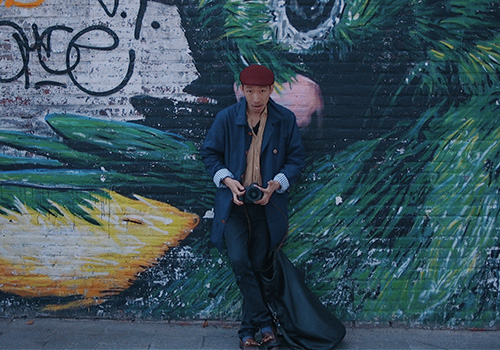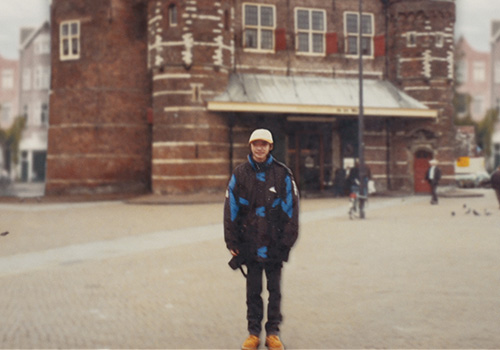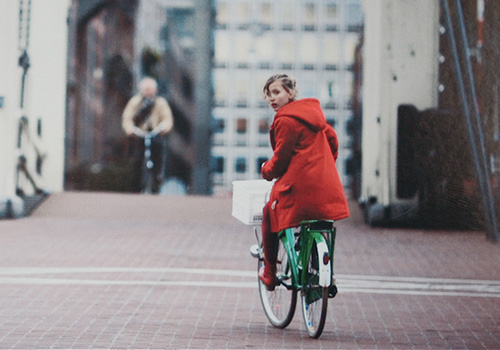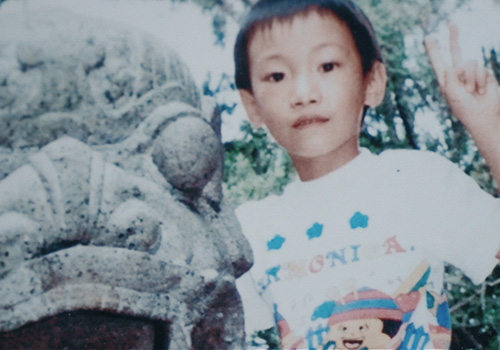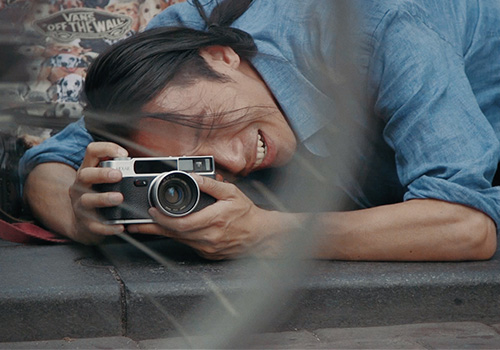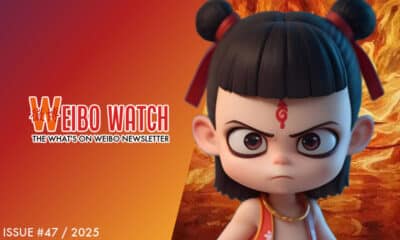China Arts & Entertainment
From Mountains of Taishan to Faces of Amsterdam – Interview with Photographer Jimmy on the Run
His past in China, his present in Amsterdam and his future in photography – Jimmy is always on the run.
Published
9 years agoon

Fashion & Street Photographer Huang Jianmin a.k.a. Jimmy is the focus of the recently released short doc Jimmy on the Run by filmmaker Wytse Koetse. The short film [7 min] shows Jimmy’s passion for the lens, his dynamic lifestyle, and his struggle with family expectations. What’s on Weibo spoke to Jimmy about his past in China, his present in Amsterdam and his future in photography.
ANOTHER LIFE
“I had never even seen a city until I was 12 years old.”
I meet Jimmy in his home in the city center of Amsterdam. It is the first time we meet, but I feel like I know him quite well – it is because I have seen the short doc Jimmy on the Run that gets up close and personal with this photographer and his work. On Jimmy’s comfortable couch, we talk about his life in China, his love for the streets of Amsterdam and the journey he’s made to get where he is today.
“I was born and raised in a village in China’s Guangdong province,” Jimmy, whose Chinese name is Huang Jianmin (黄健敏), begins: “Taishan is my hometown, Taishanese [台山话] is my native language. We lived in a rural area on the outskirts, which was like a small village. There was nothing there when I was young. I had never even seen a city until I was 12 years old. It has now changed enormously; there’s even a train going there. It was a good place for me to grow up. I could play outside with my friends all day. We would catch fish, go up the mountain and pluck fruit from the trees.”
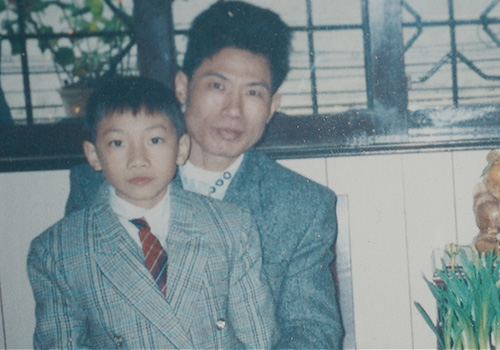
“My dad started working in Amsterdam when I was seven years old, so I mostly grew up alone with my mum. Many people from Taishan leave for America or Europe. Already since the 1900s people from [tooltip text=”Taishan is known as the No 1 Home of Overseas Chinese.”]Taishan[/tooltip] left in great numbers to the ‘Old Gold Mountain’ [旧金山, San Fransisco].”
“I was sixteen when my mum and I also moved to Amsterdam. I was afraid to leave China, and actually did not want to go. But gradually, I started to see that life in the Netherlands might bring me new opportunities. Some of my friends in Taishan are jobless now. If I would’ve stayed, I probably would’ve been married and have my own family now. I’d be in the village, and would go to the big city once a year. But my life turned out differently.”
COMING TO AMSTERDAM
“I was lucky to discover my love for photography – it saved me.”
“I soon discovered I really liked Amsterdam. It’s easier to get what I want here. It’s colorful and people are very approachable. I have been to big cities like Hong Kong, New York and Paris, but never got that same feeling there. People are down to earth here. Amsterdam might not be a fashion city like Paris, but Amsterdam sure is a people’s city.”
“I started out doing different jobs after I arrived in Amsterdam. I never graduated from any school, because of the language barrier and the different educational systems in China and the Netherlands. I would work in Chinatown supermarkets, help out in restaurant kitchens here and there, sort out the luggage at Schiphol Airport. I was also a mailman for some time, and worked as a cleaner in houses. I once found a dead guy while cleaning. After that, I was no longer afraid to get my hands dirty.”
“I am prone to addiction, and this started becoming somewhat of a problem after I came to Amsterdam. I developed an addiction for gaming. I don’t drink, I don’t smoke and I don’t gamble – but I couldn’t stop gaming.”
“Some years after I’d moved to Amsterdam, I had a girlfriend and it was through her that I first got interested in photography; she had a brother who was into it. He would take pictures at parties. I thought it was pretty cool. I would play around with my father’s camera, but then bought my own first camera in 2008 – I was just smitten with it. I started going out into the streets with it. I would search for something to shoot, and would always find it. I was lucky to discover my love for photography – it saved me from gaming. It became my new addiction.”
JIMMY ON THE RUN
“I am used to running after things – I’ve done so all my life.”
“Taking self-portraits became a way to express myself. I did not take these pictures to represent myself to others, but to record a moment in time and try to capture the feelings I had. It was something personal.”
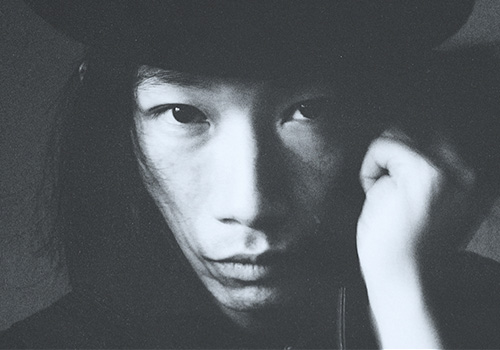
“One time when I was out taking photos, I saw a girl on the streets. She probably was around 16 years old, and was very slender with long legs. Blue jeans jacket, boots and a cigarette dangling from her mouth. When I saw her, I knew I had to take her picture. I am used to running after things – I’ve done so all my life. But this was the first time I ran after someone to take a picture, and it turned out perfect. She was the start of me taking pictures of people. I started blogging and getting active on social media. I then became Jimmy on the Run.”

“I can’t really explain how I work in doing street photography. It’s a feeling. I met a 17-year-old ginger boy today, and I thought: I need to talk to you, I need to photograph you. There will always be people saying no when I ask if I can take their picture, but you still need to ask. It has made me more confident.”
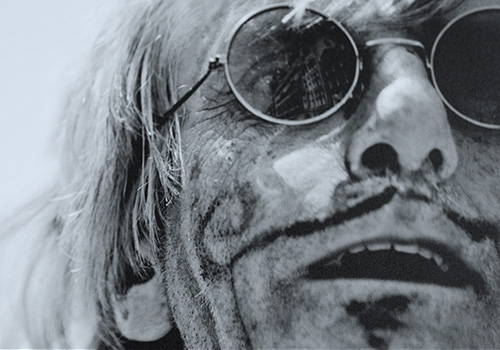
“Faces, fashion, people moving – my photographs are about the moment someone gives me. I like unique faces, they don’t have to be pretty. I like anything that’s timeless. Portraits, classic looks. I don’t feel like I need to capture the era we live in, I want to capture the moment we live in. My photos should still look good on your wall fifty years from now.”
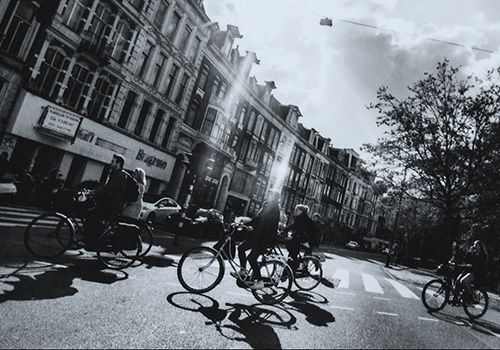
“Filmmaker Wytse Koetse liked my pictures, and started following me on social media. I also liked his work, especially the short documentary Cola Chicken. It was real, simple and pure. I loved the scene where Chen Chen [the main subject] talks about how he loves dogs, but also eats dog meat, and then says sorry to the dog. That guy is real, that’s the real shit.”
“I did not just agree to him filming me because I liked his work, but also because I felt a little lost at the time and it helped me. I had just started as a freelance photographer. It was the right timing. Wytse started coming over and followed me as I worked. We spent so much time together that we became much closer throughout the process of filming. The documentary initially was supposed to be just about my work, but in the end, it also became more about myself. We talked a lot, and I’m quite a sensitive person. My father is the man I respect most, but he’s not proud of me. When I start talking about him, I often have to cry. It’s good to face yourself. Things are much better now. If I’m gonna show my dad the documentary? I’m not sure yet. Maybe later.”
BETWEEN CHINA AND AMSTERDAM
“I grew up with Deng Xiaoping, but we learned that Mao was the sun. He was like a God to us.”
“Amsterdam has helped me open my eyes to new things. In China, I always felt restricted. In school, I had to wear a uniform and the teachers were very strict. I grew up with Deng Xiaoping, but we learned that Mao was the sun. He was like a God to us. We had one cinema and the only movies we saw were those about Mao fighting against the Japanese. Of course, my parents had it much worse than me and my life was good, but I did not feel free. Amsterdam has changed me. I look differently at life now. I never really saw things over there. I now see fashion, and see different scenes. Like the gay scene – I had never seen something like that before.”
“In China there is a great divide between the rich and the poor. In Amsterdam, there is this overall vibe of people being people – it doesn’t matter if you’re homeless or a celebrity. It’s one of the reasons I love Amsterdam so much; there’s a sense of equality.”
“For me, Holland means freedom. I can dress how I want and say what I want here. In China, I cannot. I was once hit when I tried to take a picture in Hong Kong. I am not sure I want to try to do photography in China anymore. I am more scared to do it there. I feel safer here. People here are very straightforward, and I like that: yes is yes, no is no. Shit gets done this way.”
“I don’t miss my life in China, but I do miss the food. I used to go back a lot, but now not so much. I sometimes feel a bit caught between China and Amsterdam. I’m a mix of both now. Many of the second generation Chinese who were born in the Netherlands don’t understand me. I was not born here, and our backgrounds are very different. I don’t consider them Chinese like me. But at the same time I can no longer move back to China, because I might be too Dutch now. Although I must admit, I am not as open-minded as Dutch people are. My parents will never be my ‘friends’, like it is for many Dutch here. Anyway, there is no way I could indefinitely move back to China, maybe only for a year or so. I can’t handle the smog. My friends in Shenzhen have started to look old. Besides, there is no life there for me now.”
CHOOSING A NEW PATH
“There’s no sweet without sweat – you have to work hard to achieve your dreams. ”
“Am I a street photographer or a fashion photographer? I am both. Street photography is in my heart. I want to mix street and fashion. My style is raw, I like to keep things as authentic as possible. I’m rather nostalgic and have a soft spot for the 1950s and 1960s. Sherlock Holmes, Dorian Gray, Helmut Newton, Richard Avedon. I love doing everything analog, not digital. I hate social media. I need it because it helps me, but I hate it. I used Chinese microblogs before, now I use WeChat and have Tumblr, Facebook, my blog and my website. I sometimes post very personal stuff and people don’t even see it. Every time you post something on social media you give away a little bit of yourself.”
“The relationship with my parents is now good, but they are more traditional than I am. My mum is somewhat more western than my dad is. My dad is the one I respect most in this world. I love him. But I cannot let go of the fact that I don’t make my father proud. He envisioned another life for me than the one I chose. They’d hoped that I would’ve been married by now, with kids.”
“My dream for the future? I am a one-child-policy kid, and I’ve always been jealous of people with brothers or sisters. I hope to have at least two children one day. And I would really love to have a daughter. I would take her to Disneyland. She can dress up as Batman, I’ll be Robin.”
“I also want to publish a book with my photos. It will be called the Faces of Amsterdam. I hope I can work for high-end magazines. For now, I’ll just keep on working hard. I live by ‘xian ku hou tian’ [先苦后甜, Chinese expression]: ‘there’s no sweet without sweat’. You have to work hard to achieve your dreams. That’s what happiness is, right?”
This interview was conducted and condensed by Manya Koetse in Amsterdam.
Follow @WhatsOnWeibo
To watch the short film about ‘Jimmy on the Run’, see the featured video on top of this article, or go view it at Filming Freedom. For more of Jimmy’s work, see www.jimmyontherun.com.
©2016 Whatsonweibo. All rights reserved. Do not reproduce our content without permission – you can contact us at info@whatsonweibo.com.
Manya is the founder and editor-in-chief of What's on Weibo, offering independent analysis of social trends, online media, and digital culture in China for over a decade. Subscribe to gain access to content, including the Weibo Watch newsletter, which provides deeper insights into the China trends that matter. More about Manya at manyakoetse.com or follow on X.

You may like
China Arts & Entertainment
How K-pop Fans and the 13-Year-Old Daughter of Baidu VP Sparked a Debate on Online Privacy
What began as K-pop fan outrage targeting a snarky commenter quickly escalated into a Baidu-linked scandal and a broader conversation about data privacy on Chinese social media.
Published
3 weeks agoon
March 26, 2025By
Ruixin Zhang
For an ordinary person with just a few followers, a Weibo account can sometimes be like a refuge from real life—almost like a private space on a public platform—where, along with millions of others, they can express dissatisfaction about daily annoyances or vent frustration about personal life situations.
But over recent years, even the most ordinary social media users could become victims of “opening the box” (开盒 kāihé)—the Chinese internet term for doxxing, meaning the deliberate leaking of personal information to expose or harass someone online.
A K-pop Fan-Led Online Witch Hunt
On March 12, a Chinese social media account focusing on K-pop content, Yuanqi Taopu Xuanshou (@元气桃浦选手), posted about Jang Wonyoung, a popular member of the Korean girl group IVE. As the South Korean singer and model attended Paris Fashion Week and then flew back the same day, the account suggested she was on a “crazy schedule.”
In the comment section, one female Weibo user nicknamed “Charihe” replied:
💬 “It’s a 12-hour flight and it’s not like she’s flying the plane herself. Isn’t sleeping in business class considered resting? Who says she can’t rest? What are you actually talking about by calling this a ‘crazy schedule’..”

Although the comment may have come across as a bit snarky, it was generally lighthearted and harmless. Yet unexpectedly, it brought disaster upon her.
That very evening, the woman nicknamed Charihe was bombarded with direct messages filled with insults from fans of Jang Wonyoung and IVE.
Ironically, Charihe’s profile showed she was anything but a hater of the pop star—her Weibo page included multiple posts praising Wonyoung’s beauty and charm. But that context was ignored by overzealous fans, who combed through her social media accounts looking for other posts to criticize, framing her as a terrible person.
After discovering through Charihe’s account that she was pregnant, Jang Wonyoung’s fans escalated their attacks by targeting her unborn child with insults.
The harassment did not stop there. Around midnight, fans doxxed Charihe, exposing her personal information, workplace, and the contact details of her family and friends. Her friends were flooded with messages, and some were even targeted at their workplaces.
Then, they tracked down Charihe’s husband’s WeChat account, sent him screenshots of her posts, and encouraged him to “physically punish” her.
The extremity of the online harassment finally drew backlash from netizens, who expressed concern for this ordinary pregnant woman’s situation:
💬 “Her entire life was exposed to people she never wanted to know about.”
💬 “Suffering this kind of attack during pregnancy is truly an undeserved disaster.”
Despite condemnation of the hate, some extreme self-proclaimed “fans” remained relentless in the online witch hunt against Charihe.
Baidu Takes a Hit After VP’s 13-Year-Old Daughter Is Exposed
One female fan, nicknamed “YourEyes” (@你的眼眸是世界上最小的湖泊), soon started doxxing commenters who had defended her. The speed and efficiency of these attacks left many stunned at just how easy it apparently is to trace social media users and doxx them.
Digging into old Weibo posts from the “YourEyes” account, people found she had repeatedly doxxed people on social media since last year, using various alt accounts.
She had previously also shared information claiming to study in Canada and boasted about her father’s monthly salary of 220,000 RMB (approx. $30.3K), along with a photo of a confirmation document.
Piecing together the clues, online sleuths finally identified her as the daughter of Xie Guangjun (谢广军), Vice President of Baidu.
From an online hate campaign against an innocent, snarky commenter, the case then became a headline in Chinese state media, and even made international headlines, after it was confirmed that the user “YourEyes”—who had been so quick to dig up others’ personal details—was in fact the 13-year-old daughter of Xie Guangjun, vice president at one of China’s biggest tech giants.
On March 17, Xie Guangjun posted the following apology to his WeChat Moments:

💬 “Recently, my 13-year-old daughter got into an online dispute. Losing control of her emotions, she published other people’s private information from overseas social platforms onto her own account. This led to her own personal information also getting exposed, triggering widespread negative discussion.
As her father, I failed to detect the problem in time and failed to guide her in how to properly handle the situation. I did not teach her the importance of respecting and protecting the privacy of others and of herself, for which I feel deep regret.
In response to this incident, I have communicated with my daughter and sternly criticized her actions. I hereby sincerely apologize to all friends affected.
As a minor, my daughter’s emotional and cognitive maturity is still developing. In a moment of impulsiveness, she made a wrong decision that hurt others and, at the same time, found herself caught in a storm of controversy that has subjected her to pressure and distress far beyond her age.
Here, I respectfully ask everyone to stop spreading related content and to give her the opportunity to correct her mistakes and grow.
Once again, I extend my apologies, and I sincerely thank everyone for your understanding and kindness.”
The public response to Xie’s apology has been largely negative. Many criticized the fact that it was posted privately on WeChat Moments rather than shared on a public platform like Weibo. Some dismissed the statement as an attempt to pacify Baidu shareholders and colleagues rather than take real accountability.
Netizens also pointed out that the apology avoided addressing the core issue of doxxing. Concerns were raised about whether Xie’s position at Baidu—and potential access to sensitive information—may have helped his daughter acquire the data she used to doxx others.
Adding fuel to the speculation were past conversations allegedly involving one of @YourEyes’ alt accounts. In one exchange, when asked “Who are you doxxing next?” she replied, “My parents provided the info,” with a friend adding, “The Baidu database can doxx your entire family.”
Following an internal investigation, Baidu’s head of security, Chen Yang (陈洋), stated on the company’s internal forum that Xie Guangjun’s daughter did not obtain data from Baidu but from “overseas sources.”
However, this clarification did little to reassure the public—and Baidu’s reputation has taken a hit. The company has faced prior scandals, most notably a the 2016 controversy over profiting from misleading medical advertisements.
Online Vulnerability
Beyond Baidu’s involvement, the incident reignited wider concerns about online privacy in China. “Even if it didn’t come from Baidu,” one user wrote, “the fact that a 13-year-old can access such personal information about strangers is terrifying.”
Using the hashtag “Reporter buys own confidential data” (#记者买到了自己的秘密#), Chinese media outlet Southern Metropolis Daily (@南方都市报) recently reported that China’s gray market for personal data has grown significantly. For just 300 RMB ($41), their journalist was able to purchase their own household registration data.
Further investigation uncovered underground networks that claim to cooperate with police, offering a “70-30 profit split” on data transactions.
These illegal data practices are not just connected to doxxing but also to widespread online fraud.
In response, some netizens have begun sharing guides on how to protect oneself from doxxing. For example, they recommend people disable phone number search on apps like WeChat and Alipay, hide their real name in settings, and avoid adding strangers, especially if they are active in fan communities.
Amid the chaos, K-pop fan wars continue to rage online. But some voices—such as influencer Jingzai (@一个特别虚荣的人)—have pointed out that the real issue isn’t fandom, but the deeper problem of data security.
💬 “You should question Baidu, question the telecom giants, question the government, and only then, fight over which fan group started this.”
As for ‘Charihe,’ whose comment sparked it all—her account is now gone. Her username has become a hashtag. For some, it’s still a target for online abuse. For others, it is a reminder of just how vulnerable every user is in a world where digital privacy is far from guaranteed.
By Ruixin Zhang
Independently covering digital China for over a decade. Like what we do? Support us and get the story behind the hashtag by subscribing:
edited for clarity by Manya Koetse
Spotted a mistake or want to add something? Please let us know in comments below or email us. First-time commenters, please be patient – we will have to manually approve your comment before it appears.
©2024 Whatsonweibo. All rights reserved. Do not reproduce our content without permission – you can contact us at info@whatsonweibo.com.
China Memes & Viral
How Ne Zha 2’s Shen Gongbao Became Known as the Ultimate “Small-Town Swot”
Published
2 months agoon
March 1, 2025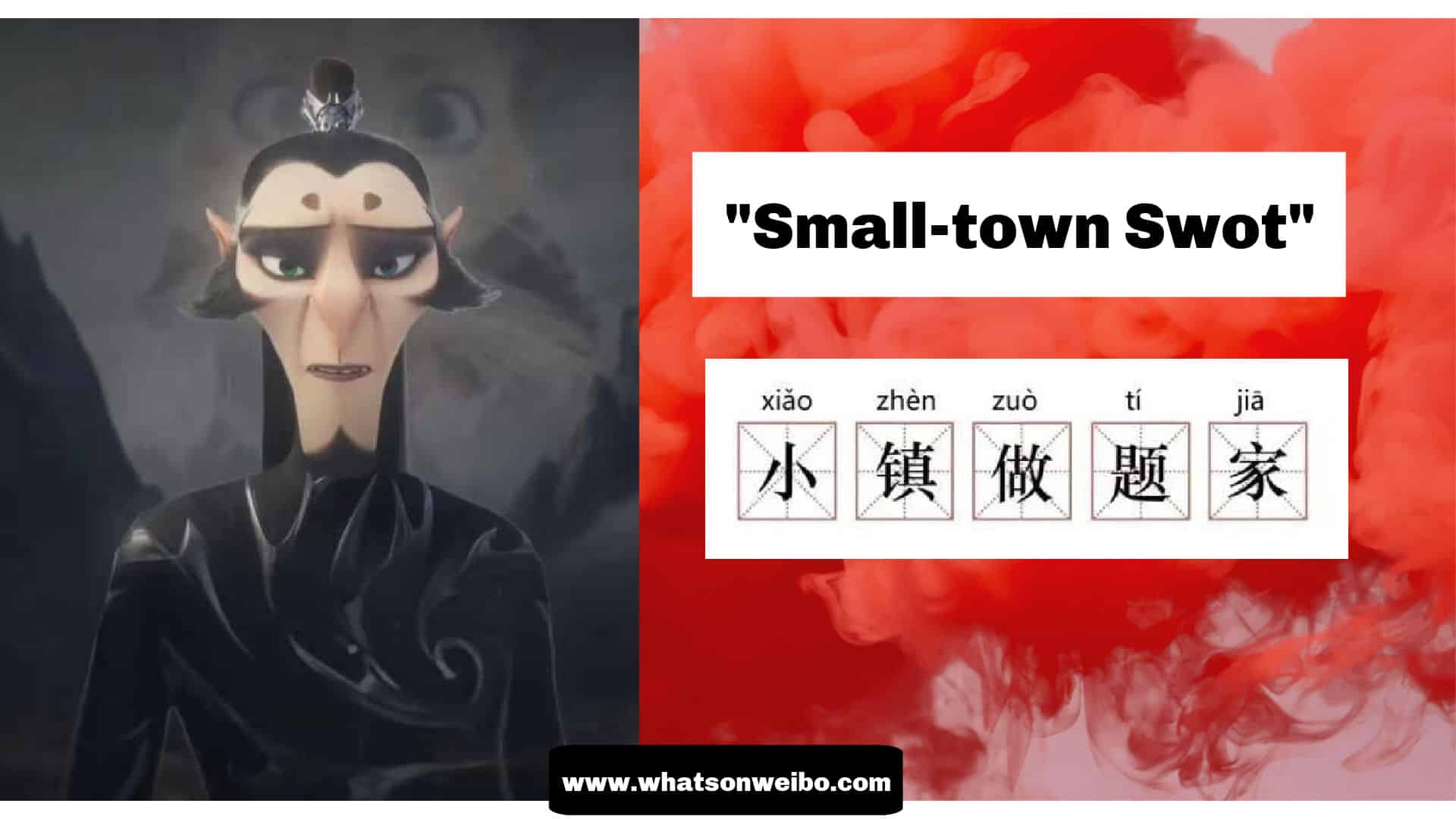
PART OF THIS TEXT COMES FROM THE WEIBO WATCH PREMIUM NEWSLETTER
Over the past few weeks, the Chinese blockbuster Ne Zha 2 has been trending on Weibo every single day. The movie, loosely based on Chinese mythology and the Chinese canonical novel Investiture of the Gods (封神演义), has triggered all kinds of memes and discussions on Chinese social media (read more here and here).
One of the most beloved characters is the leopard demon Shen Gongbao (申公豹). While Shen Gongbao was a more typical villain in the first film, the narrative of Ne Zha 2 adds more nuance and complexity to his character. By exploring his struggles, the film makes him more relatable and sympathetic.
In the movie, Shen is portrayed as a sometimes sinister and tragic villain with humorous and likeable traits. He has a stutter, and a deep desire to earn recognition. Unlike many celestial figures in the film, Shen Gongbao was not born into privilege and never became immortal. As a demon who ascended to the divine court, he remains at the lower rungs of the hierarchy in Chinese mythology. He is a hardworking overachiever who perhaps turned into a villain due to being treated unfairly.
Many viewers resonate with him because, despite his diligence, he will never be like the gods and immortals around him. Many Chinese netizens suggest that Shen Gongbao represents the experience of many “small-town swots” (xiǎozhèn zuòtíjiā 小镇做题家) in China.
“Small-town swot” is a buzzword that has appeared on Chinese social media over the past few years. According to Baike, it first popped up on a Douban forum dedicated to discussing the struggles of students from China’s top universities. Although the term has been part of social media language since 2020, it has recently come back into the spotlight due to Shen Gongbao.
“Small-town swot” refers to students from rural areas and small towns in China who put in immense effort to secure a place at a top university and move to bigger cities. While they may excel academically, even ranking as top scorers, they often find they lack the same social advantages, connections, and networking opportunities as their urban peers.
The idea that they remain at a disadvantage despite working so hard leads to frustration and anxiety—it seems they will never truly escape their background. In a way, it reflects a deeper aspect of China’s rural-urban divide.
Some people on Weibo, like Chinese documentary director and blogger Bianren Guowei (@汴人郭威), try to translate Shen Gongbao’s legendary narrative to a modern Chinese immigrant situation, and imagine that in today’s China, he’d be the guy who trusts in his hard work and intelligence to get into a prestigious school, pass the TOEFL, obtain a green card, and then work in Silicon Valley or on Wall Street. Meanwhile, as a filial son and good brother, he’d save up his “celestial pills” (US dollars) to send home to his family.
Another popular blogger (@痴史) wrote:
“I just finished watching Ne Zha and my wife asked me, why do so many people sympathize with Shen Gongbao? I said, I’ll give you an example to make you understand. Shen Gongbao spent years painstakingly accumulating just six immortal pills (xiāndān 仙丹), while the celestial beings could have 9,000 in their hand just like that.
It’s like saving up money from scatch for years just to buy a gold bracelet, only to realize that the trash bins of the rich people are made of gold, and even the wires in their homes are made of gold. It’s like working tirelessly for years to save up 60,000 yuan ($8230), while someone else can effortlessly pull out 90 million ($12.3 million).In the Heavenly Palace, a single meal costs more than an ordinary person’s lifetime earnings.
Shen Gongbao seems to be his father’s pride, he’s a role model to his little brother, and he’s the hope of his entire village. Yet, despite all his diligence and effort, in the celestial realm, he’s nothing more than a marginal figure. Shen Gongbao is not a villain, he is just the epitome of all of us ordinary people. It is because he represents the state of most of us normal people, that he receives so much empathy.”
In the end, in the eyes of many, Shen Gongbao is the ultimate small-town swot. As a result, he has temporarily become China’s most beloved villain.
By Manya Koetse, with contributions by Wendy Huang
Follow @whatsonweibo
Spotted a mistake or want to add something? Please let us know in comments below or email us. Please note that your comment below will need to be manually approved if you’re a first-time poster here.
©2025 Whatsonweibo. All rights reserved. Do not reproduce our content without permission – you can contact us at info@whatsonweibo.com
Subscribe

Chinese New Nickname for Trump Mixes Fairy Tales with Tariff War

China Trending Week 15/16: Maozi & Meigui Fallout, Datong Post-Engagement Rape Case

China Reacts: 3 Trending Hashtags Shaping the Tariff War Narrative

No Quiet Qingming: From High-Tech Tomb-Sweeping to IShowSpeed & the Seven China Streams

From Trade Crisis to Patriotic Push: Chinese Online Reactions to Trump’s Tariffs

“Dear Li Hua”: The TikTok/Xiaohongshu Honeymoon Explained

Beyond the Box Office: What’s Behind Ne Zha 2’s Success?

15 Years of Weibo: The Evolution of China’s Social Media Giant

Tuning Into the Year of the Snake

IShowSpeed in China: Streaming China’s Stories Well

TikTok Refugees, Xiaohongshu, and the Letters from Li Hua

The ‘China-chic Girl’ Image and the Realities of China’s Competitive Food Delivery Market

US-Russia Rapprochement and “Saint Zelensky”: Chinese Online Reactions to Trump’s Shake-Up

“Black Myth: Wukong”: From Gaming Screens to the CMG Spring Festival Gala?

How Ne Zha 2’s Shen Gongbao Became Known as the Ultimate “Small-Town Swot”
Get in touch
Would you like to become a contributor, or do you have any tips or suggestions? Get in touch here!
Popular Reads
-

 China Insight11 months ago
China Insight11 months agoThe Tragic Story of “Fat Cat”: How a Chinese Gamer’s Suicide Went Viral
-

 China Digital10 months ago
China Digital10 months agoChina’s 2024 Gaokao Triggers Online Discussions on AI
-

 China Arts & Entertainment11 months ago
China Arts & Entertainment11 months agoSinging Competition or Patriotic Fight? Hunan TV’s ‘Singer 2024’ Stirs Nationalistic Sentiments
-

 China Arts & Entertainment12 months ago
China Arts & Entertainment12 months ago“Old Bull Eating Young Grass”: 86-Year-Old Chinese Painter Fan Zeng Marries 36-Year-Old Xu Meng

